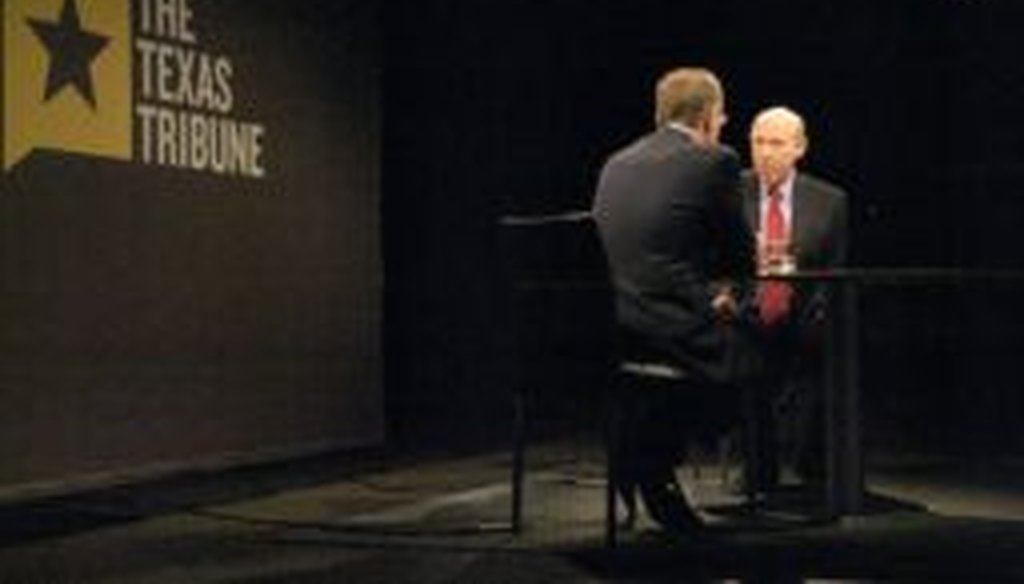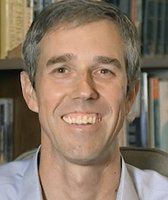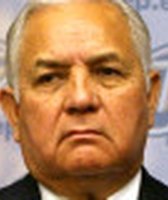Stand up for the facts!
Our only agenda is to publish the truth so you can be an informed participant in democracy.
We need your help.
I would like to contribute

Texas Tribune CEO Evan Smith interviews Democratic gubernatorial nominee Bill White
Can we say that the gubernatorial candidates faced off if they never shared face time? On Oct. 15, Gov. Rick Perry and Bill White, the Democratic nominee for governor, participated in back-to-back interviews with Texas Tribune CEO and Editor-in-Chief Evan Smith. Each man defended his records and took a couple of swings at his opponent. Some of the jabs we've tested before.
Take taxes. White has said he won't rule out seeking tax increases if he's elected — a point the governor's campaign has pounced on. White has responded by boasting about his tax record while mayor of Houston.
"Every time I ran for mayor, I didn't commit to raise or lower taxes," he said to Smith. "Five straight years I was able to lower the property tax rate." In May, we rated Half True White's claim that he cut "tax rates five times." Houston's property tax rate was cut five years in a row on White's watch, but the property values citywide were increasing at a faster pace. That meant the average residential tax bill actually rose by an annual average of 4.8 percent from 2006 to 2009.
White figuratively rolls his eyes every time Perry brags about the economy in Texas, arguing that Perry takes credit when times are good and passes the buck when the state is in a bind.
"The fact is our unemployment rate is higher than in our neighboring states," he told Smith. "We have a million people unemployed for the first time."
Texas has a higher unemployment than three of the four states it borders — New Mexico had the same unemployment rate of 8.3 percent in August, the most recent data available when we originally reviewed White's statement. We rated it Mostly True. White also said in March that "there's almost 1 million Texans who are unemployed, and that's an all-time record number in our state." We rated that True, and today, the number of unemployed has surpassed the 1 million mark.
On the other hand, during his interview with Smith, Perry twice celebrated the appeal of Texas by saying more than 1,000 people move here every day. We rated that statement Mostly True in a January article. Perry's calculation late last year didn't take into account in-state births or people moving away, yet Internal Revenue Service data suggest that 1,353 people a day moved to Texas from tax-filing time in 2007 to filing time in 2008.
In another turn Friday, a viewer's question referenced the fact that state spending has increased 80 percent in Perry's time as governor. In August, we rated a similar statement by White Mostly True, while pointing out that the increase reflected all funding sources, not solely state revenue. On Friday, Perry conceded the percentage increase and then said that the "state budget grew less than population and inflation" over the 10-plus years.
We don't have a comparison of state spending to increases in population or inflation on Perry's watch, but in checking White's August claim that the state budget increased 80 percent under Perry, we found that counting all funding sources, the state budget adjusted for changes in population and inflation has increased 18 percent during Perry's gubernatorial years.
White, noting that he has "a lot of support among police officers," said that "we brought crime rates down" in Houston. On his website, White claims that during his tenure as mayor, he "saw Houston's crime rates drop to the lowest levels in more than 25 years." We rated that True: According to data kept by the Department of Public Safety, 2008 saw the lowest crime rate in Houston in the past 25 years: 6,053.7 offenses per 100,000 residents. But Houston wasn't the only city to enjoy lower crime rates — according to FBI data, the nation's total crime rate in 2008 was down 29 percent from 1983, 25 years earlier.
On the flip side, White suggested that Perry is trying to buff his record on border issues by lying about border crime statistics. "Rick Perry, on his website, I haven't checked today, but for a long time, he claimed that in the last few years, crime in the unincorporated areas all along the border, had been cut by 65 percent," White said.
In March, we analyzed a similar claim on Perry's campaign website: Perry's "border security efforts have led to a 60 percent decrease in border crime." We rated that Pants on Fire because the data on which the claim was based (from unincorporated areas of counties along the border) ignored a significant detail — i.e., crimes that occurred in all the border region's towns and cities. It also compared two calendar quarters — the third quarter of 2005 and the third quarter of 2007 — rather than weighing years' worth of data.
When we looked at crime over all three years of data — 2005 through 2007 — the decline amounted to less than 1 percent. We also considered the data for both urban and rural areas of all the border counties during those years. The total number of "index" or serious crimes rose from 103,884 in 2005 to 103,986 in 2007.
White has also accused Perry of focusing too much on Washington. In a segment of the interview contrasting Perry's acceptance of federal stimulus aid and rejection of other federal monies, Perry referred to what he called the cost to Texas from implementing the federal health care plan passed by Congress this year. "We know it was going to cost us $27 billion more in the next 10 years," Perry said.
We aren't familiar with that figure, but in March we rated Barely True a similar statement by Lt. Gov. David Dewhurst based on projections by the Texas Health and Human Services Commission. Dewhurst had said the federal plan would cost Texas taxpayers $2.4 billion a year over 10 years — a total we found squishy in part because the 10-year period didn't start until 2014; the state labeled $6 billion of the estimate a "possible" cost, and the estimate was based on an outdated version of the federal legislation. Finally, we found that nearly half of the $24.3 billion (over 10 years) was money the state would have to spend anyway — regardless of health care reform — if people already eligible for Medicaid and the Children's Health Insurance Program signed up.
Toward the end of his interview with Smith, Perry said he has vetoed $3 billion in spending — "more than all other governors combined." That comparison to other governors hasn't been through the Truth-O-Meter. But we noted in a February check of Perry's veto boast that the $3 billion figure was earlier debunked by the Dallas Morning News, which found that much of Perry's vetoed spending never would have happened regardless.
The newspaper said nearly $2.5 billion of the more than $3 billion touted by Perry was doomed because separate legislation authorizing the expenditures never passed into law. The newspaper's analysis continued: "The governor has even acknowledged that the vetoes were merely procedural. In supporting materials for the ad, his campaign points to the veto proclamations Perry issued at the time, and in those, he explains that the underlying bills failed to pass the Legislature."
Our Sources
The Texas Tribune, An hour with Rick Perry, Oct. 18, 2010
The Texas Tribune, An hour with Bill White, Oct. 18, 2010













































